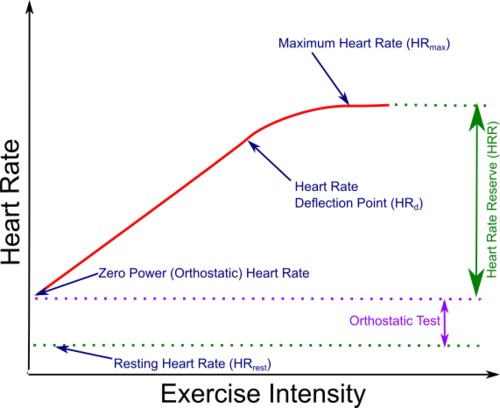Difference between revisions of "Heart Rate"
From Fellrnr.com, Running tips
User:Fellrnr (User talk:Fellrnr | contribs) |
User:Fellrnr (User talk:Fellrnr | contribs) |
||
| Line 5: | Line 5: | ||
=See Also= | =See Also= | ||
* [[Maximum Heart Rate]] | * [[Maximum Heart Rate]] | ||
| − | * [[ | + | * [[Heart Rate Reserve]] |
* [[Heart Rate Reserve]] | * [[Heart Rate Reserve]] | ||
* [[Pulse Oximeter]] | * [[Pulse Oximeter]] | ||
* [[Heart Rate Deflection]] | * [[Heart Rate Deflection]] | ||
| − | * [[Heart Rate | + | * [[Heart Rate Monitor]] |
Revision as of 15:54, 7 June 2014

A simplified chart of heart rate against exercise intensity showing Maximum Heart Rate, Heart Rate Reserve, Resting Heart Rate and Heart Rate Deflection.
As exercise intensity increases the heart beats faster, and it's relatively easy to measure heart rate while exercising. This makes heart rate a simple way of evaluating exercise intensity, but you need to understand a couple of common issues to use it effectively.
- Exercise heart rate should be evaluated as a percentage of Heart Rate Reserve. However, you need to do an individual test to determine Maximum Heart Rate. Never use a formula to predict Maximum Heart Rate, as these formulas are useless. If you do a Maximum Heart Rate test, then you can calculate your Heart Rate Reserve, which can be used to estimate exercise intensity.
- A second significant problem with Heart Rate Training is that the relationship between Heart Rate and exercise intensity often changes during prolonged exercise, a phenomenon known as Heart Rate Drift.